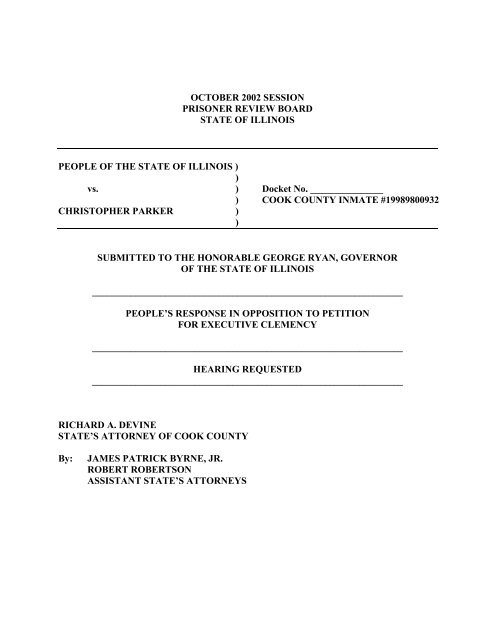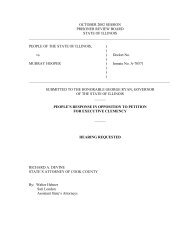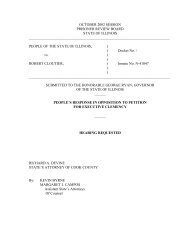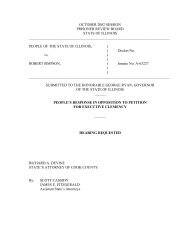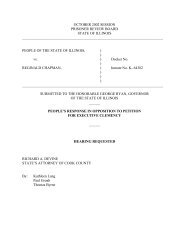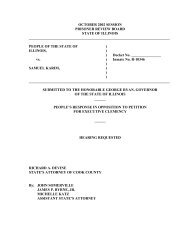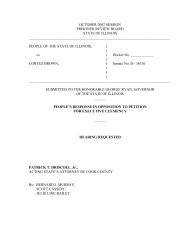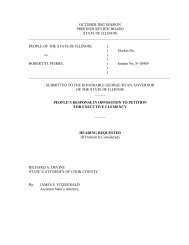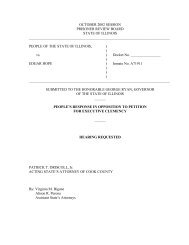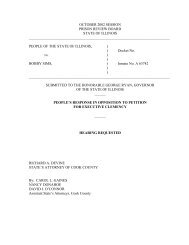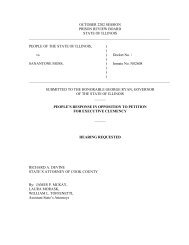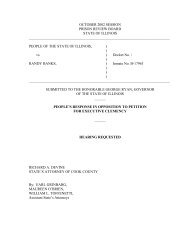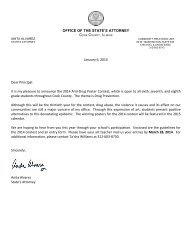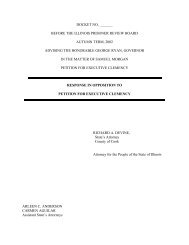Chris Parker - Cook County State's Attorney
Chris Parker - Cook County State's Attorney
Chris Parker - Cook County State's Attorney
Create successful ePaper yourself
Turn your PDF publications into a flip-book with our unique Google optimized e-Paper software.
of child abuse. All of the pathologists, whether relied on by the defense or the prosecution,agreed that Joshua died as result of blows inflicted within hours of his death.After being confronted with the irrefutable findings of the medical examiner, and the factthat he was the only person with Joshua when the injuries were inflicted, <strong>Parker</strong> confessed. Inhis signed handwritten confession, <strong>Parker</strong> admitted that he punched Joshua in the stomachbecause Joshua wouldn’t listen to <strong>Parker</strong> when <strong>Parker</strong> told him to stop crying.After deliberating for three and one half hours, the jury returned a verdict of guilty.IIIREASONS FOR DENYING CLEMENCY<strong>Parker</strong> asks this Board and the Governor to violate the laws and the Constitution of thisState and grant clemency because he claims the system is flawed, his defense attorney wasunder-qualified, and he did not benefit from the reforms suggested by the Governor’sCommission on Capital Punishment. Specifically, <strong>Parker</strong>, who has yet to be sentenced for hismurder, asks that the Executive branch of the State interfere with both the Legislative andJudicial branches and dictate to the judge in this case what punishment he may or may notimpose. In support of his ludicrous request, <strong>Parker</strong> does not offer a single Illinois case, provideany controlling authority, or offer any sound rationale that would justify such a blatant andobvious violation of our laws. Instead, <strong>Parker</strong> questions the ability of one of his attorneys andpoints to the Commission’s suggested reforms. How <strong>Parker</strong>’s allegations with regard to hisattorney or the Commission’s suggested reforms provide a basis for violating our laws andConstitution is a mystery. Nevertheless, the People will briefly address <strong>Parker</strong>’s claims anddispense with them forthwith.A. PARKER ASKS THIS BOARD AND THE GOVERNOR TO SETASIDE SETTLED LAW AND VIOLATE THE CONSTITUTION<strong>Parker</strong> asserts that he is entitled to clemency even before a sentencing hearing has beenheld and, therefore, before a sentence of death has been imposed. In an attempt to circumventwell-established law and procedure, <strong>Parker</strong> claims that the only prerequisite to the Governor’sability to grant clemency is the conviction. <strong>Parker</strong>’s request is not well grounded in law or fact.<strong>Parker</strong> is not asking the Governor to exercise authority to commute a properly imposed sentence.Rather, he is attempting to use this request for clemency as a vehicle to impair and interfere withhis pending criminal case. At this time, <strong>Parker</strong> is simply eligible for the death penalty, like anumber of other individuals who have committed atrocious acts against the peace and dignity ofour State, and, until a sentencing hearing is completed and a sentence imposed, <strong>Parker</strong>’s requestis improper.3
Although <strong>Parker</strong> seeks executive clemency to prevent him from being executed, it is clearthat such a claim is premature since he is not currently subject to a sentence of death. Article V,section 12 of the Illinois Constitution of 1970 expressly provides that “the Governor may grantreprieves, commutations and pardons, after conviction, for all offenses on such terms as hethinks proper” (emphasis added) and Illinois law has long required the imposition of a validsentence as a necessary precondition to the existence of any conviction. See e.g. People v.Hager, __ Ill.2d___, 2002 Ill. LEXIS 374 at *8 (No. 90115 August 29, 2002) (“the word“conviction” is a term of art which means a final judgment that includes both a conviction andsentence”)(emphasis in original). Similarly, in Faunce v. People, 51 Ill. 311, 313 (1869), theIllinois Supreme Court expressly rejected the claim that under the Illinois Constitution of 1848the Governor had the authority to grant clemency even though no sentence had been imposed.Moreover, it is clear that such a limitation on the Governor’s clemency powers isnecessary because any grant of clemency prior to the imposition of a sentence in a particular casewould violate the clear separation of powers under the Illinois Constitution. Article II, section 1,of the Illinois Constitution of 1970 expressly provides: “The legislative, executive and judicialbranches are separate. No branch shall exercise powers properly belonging to another. TheIllinois Supreme Court has long held, “ the power to impose sentence is exclusively a function ofthe judiciary.” People v. Davis, 93 Ill.2d 155, 161, 442 N.E.2d 855(1982)(emphasis added). Seealso People v. Phillips, 66 Ill.2d 412, 415, 362 N.E.2d 1037 (1977); People v. Montana, 380 Ill.596, 608, 44 N.E.2d 569 (1942). Therefore, any attempt by the Governor to preclude the courtsof this State from considering a particular sentence which has been authorized by the legislaturewould be an unconstitutional infringement of the judicial power which was “exclusively andexhaustively” granted to the courts by Article VI, section 1. People v. Cox, 82 Ill.2d 268, 274,412 N.E.2d 541 (1980); See also People v. Jackson, 69 Ill.2d 252, 256, 371 N.E.2d 602 (1977)(stating that “although the Constitution of 1970 does not define judicial power, it is an exclusivegrant of all such power of the courts.”)Petitioner also advances the disingenuous claim that it is fundamentally unfair that hewould not be able to seek clemency simply because he was not sentenced at his initial sentencinghearing. Petitioner is doing nothing less than attempting to get two bites at the apple, withoutfollowing the proper procedures for either avenue. In an attempt to gain this Board’srecommendation of leniency, the Petitioner has falsely represented that it was Judge Porter whodelayed his sentencing hearing. Quite to the contrary, it was the Petitioner, through hisattorneys, that requested a delay in the proceedings to file additional post-trial motions anddetermine which course they wanted to follow.B. DEFENDANT CLAIMS THAT THE SYSTEM IS FLAWED BUTHIDES THE FACT THAT HE WAS TRIED PURSUANT TO THENEW SUPREME COURT RULES.<strong>Parker</strong> claims that he is entitled to clemency because the system under which he wasconvicted is seriously flawed and poses an unacceptably high risk that innocent persons will becondemned to death. Instead of providing a scintilla of evidence to support such an allegation,4
<strong>Parker</strong> merely chants the mantra of the uninformed vocal minority whose sole objective is theelimination of the death penalty. Most egregious, however, is that <strong>Parker</strong> lies to this Boardthrough omission. <strong>Parker</strong> conveniently omits the fact that his trial was conducted pursuant to thenew Supreme Court rules for capital cases even though the rules were not necessarily applicabledue to the fact the his case was arraigned in February 1998 -- a full three years prior to theeffective date of the new rules. Despite the fact that the rules were not applicable to <strong>Parker</strong>’scase, <strong>Parker</strong> asked the judge to apply the rules. The judge, in an effort to eliminate any questionof unfairness, complied with <strong>Parker</strong>’s request. <strong>Parker</strong> benefited from every one of the newSupreme Court rules. The only rule the judge did not enforce, at <strong>Parker</strong>’s request, was the rulegoverning the qualifications of his attorneys. At <strong>Parker</strong>’s request, the judge allowed hisattorneys to represent him despite the fact that they were not admitted to the Capital LitigationBar. Because, technically, the new rules were not applicable to <strong>Parker</strong>’s case, the judge couldaccede to <strong>Parker</strong>’s wishes. Therefore, rather than being victimized by a “flawed” system, <strong>Parker</strong>actually received the benefit of far more due process rights than required by law. Again, heconveniently hides this fact from the Board.C. PARKER’S CLAIM OF INEFFECTIVE COUNSEL IS PATENTLYDISINGENUOUS AND PURPOSEFULLY MISLEADING.<strong>Parker</strong> now claims that he was prejudiced because his lead attorney, David Shelton, wastoo inexperienced and not a member of the Capital Litigation Bar. <strong>Parker</strong> intentionally misleadsthis Board. In fact, when the judge, at <strong>Parker</strong>’s request, decided to apply the new Supreme Courtrules to this case, it was <strong>Parker</strong> himself who asked the judge not to enforce the rules regardingthe qualifications of the attorneys. Once the judge made the new rules applicable, the State, onthe record and on the countless occasions, asked the court to assign an attorney who was amember of the Capital Litigation Bar. On each of these occasions, the judge questioned <strong>Parker</strong>and <strong>Parker</strong> insisted that he did not want the judge to assign another attorney much less anattorney from the Capital Litigation Bar. Had the judge not allowed <strong>Parker</strong>’s request to have theattorneys of his choosing, <strong>Parker</strong> would now be claiming that the judge interfered with hisconstitutional right to counsel. <strong>Parker</strong> can’t have it both ways. He made his decision with regardto his attorney. He cannot now claim prejudice. Furthermore, while <strong>Parker</strong> plays fast and loosewith the truth before this Board, he still has that same attorney representing him in court.In addition to being disingenuous in this claim, <strong>Parker</strong> fails to provide a single concreteexample of how his attorney failed to properly represent him or how, exactly, he was prejudicedby his attorney’s qualifications. <strong>Parker</strong> also fails to mention that his lead attorney, DavidShelton, was not <strong>Parker</strong>’s only attorney. In fact, <strong>Parker</strong> had four attorneys. All zealouslyrepresented <strong>Parker</strong> before and during the trial and all continue to represent him to this day.5
D. PARKER POINTS TO SUGGESTED REFORMS AS A BASISFOR THIS BOARD AND THE GOVERNOR TO VIOLATETHE LAWS AND CONSTITUTION OF THIS STATE.<strong>Parker</strong> claims that he was somehow prejudiced because he did not benefit from thesuggested reforms of the Governor’s Commission on Capital Punishment. Why <strong>Parker</strong>, andother Petitioners currently before this Board, rely on this Commission’s suggestions is confusingat best. The Commission’s suggested reforms are not law and have no bearing on <strong>Parker</strong>’s case.<strong>Parker</strong> cannot possibly have been prejudiced by reforms that exist only as mere suggestion.Nevertheless, <strong>Parker</strong> points to three of the Commission’s suggested reforms and claims that hewas prejudiced because he did not benefit from these suggested reforms. Notably, <strong>Parker</strong>doesn’t say how he was prejudiced and he doesn’t claim that the outcome of his trial would havebeen different even if these reforms had applied to his case. Despite the irrelevance of theCommission’s suggestions, the People will briefly address these last groundless claims of thePetitioner.<strong>Parker</strong> first claims that he is entitled to Clemency because the statutory eligibility factorunder which a sentence of death is being sought – the murder of a child under the age of 12 yearsold whose death resulted from exceptionally brutal or heinous behavior indicative of wantoncruelty – was a factor that the Governor’s Commission recommended for elimination.<strong>Parker</strong> asserts that he is entitled to clemency because he may be found eligible for thedeath penalty based upon an aggravating factor other than those factors which the Governor’sCommission has recommended be retained. Specifically, the Commission concluded that thecurrent list of 20 factors is overly expansive and therefore unconstitutional. Accordingly, it wassuggested that the list be reduced to just five factors: (1) murder of a peace officer or fireman;(2) murder of any person in any correctional facility; (3) multiple murder; (4) murderaccompanied by the intentional infliction of torture; and (5) murder of a witness, prosecutor,defense attorney, juror, judge or investigator.The Illinois Supreme Court has expressly rejected the Commission’s logic and held thatIllinois’ death penalty statute satisfies the constitutional mandate because it “genuinely narrowsthe class of individuals eligible for the death penalty and reasonably justifies imposition of amore severe sentence on those defendants compared to others found guilty of first degreemurder.” People v. Ballard, ___ Ill.2d ___, 2002 Ill. LEXIS 376 at *73 (No. 88885 August 29,2002) (citing Zant v. Stephens, 462 U.S. 862, 877, 103 S. Ct. 2733, 2742 (1983)). As the Ballardcourt explained, “there are innumerable examples of first degree murders that do not fit withinany of the statutes eligibility factors” and each provision is narrowly tailored to fit a specific setof facts and circumstances,” Id., 2002 Ill. LEXIS 376 at *74.Moreover, each of the aggravating factors represents a determination by the GeneralAssembly that certain types of murders are so deplorable that the death sentence may beimposed. Each one is intended to ensure that the most helpless members of our society, such as achild, are protected against violence or to provide a strong disincentive for the offender to kill the6
victim. Furthermore, it is not simply the killing of any child that makes the defendant eligiblefor capital punishment. Rather, it is only in those instances, such as in this case, where the deathresults from exceptionally brutal and heinous behavior indicative of wanton cruelty. Clearly, thelegislature has a legitimate interest in protecting the most vulnerable and innocent victims of oursociety from horrific acts of abuse.<strong>Parker</strong> next claims that he is entitled to clemency because his confession to this crimewas not electronically recorded, a procedure that the Governor’s Commission recommended forall custodial interrogations. Specifically, <strong>Parker</strong> claims that he should be granted clemencybecause the confession in which he inculpated himself was admitted into evidence even though itwas not videotaped. What <strong>Parker</strong> fails to recognize is that neither the Commission nor theGovernor himself call for the suppression of a statement simply because it was not videotaped.Rather, even under the Governor’s proposed legislation (HB3717 & HB2058), such statementswill still be admissible if the trial court finds that it was voluntarily made after considering thetotality of the circumstances. Because the trial judge expressly found that <strong>Parker</strong>’s statementwas voluntarily made when it denied his Motion To Suppress Statements, it is clear that thefailure to videotape his statement had absolutely no effect on the fairness of his proceedings.Moreover, because the jury was instructed pursuant to Illinois Pattern Instruction 3.06-3.07 toconsider all the evidence when determining whether or not petitioner made a statement and howmuch weight it should be given, <strong>Parker</strong> cannot complain that he was prevented from asserting attrial that his statement was unreliable and should not be considered.<strong>Parker</strong>’s claim is based on his allegation that his handwritten confession was fabricated.<strong>Parker</strong> does not claim that he was coerced into falsely inculpating himself, but rather that theentire statement was fictional. This self serving claim is inconsistent with all of the evidenceoffered at trial during which it was established that <strong>Parker</strong> was the only one who could haveinflicted these injuries and that he confessed to the crime. Moreover, <strong>Parker</strong> fails to mentionthat, when he gave his confession, he reviewed the entire written document, made correctionsand then affixed his signature to every page -- just as he affixed his signature to his Petition.Finally, <strong>Parker</strong> asserts that he is entitled to clemency because the State’s <strong>Attorney</strong> of<strong>Cook</strong> <strong>County</strong> made the decision to seek death in his case without the benefit of a State ReviewCommittee as recommended by the Governor’s Commission. <strong>Parker</strong> claims the imposition ofthe death sentence should be barred because the State’s <strong>Attorney</strong>’s decision to seek death wasmade without uniform protocols to guide his discretion and was not approved by a state-widereview committee. However, “[i]t has long been recognized by the Illinois Supreme Court thatthe State’s <strong>Attorney</strong> is endowed with the exclusive discretion to decide which of several chargesshall be brought, or whether to prosecute at all. A prosecutor’s discretion extends to decisionsabout whether or not the death penalty should be sought.” People v. Jamison, 197 Ill.2d 135,161-62, 756 N.E.2d 788 (2001). Therefore, any attempt to mandate such a review wouldconstitute an impermissible restriction on the independence of the various State’s <strong>Attorney</strong>sunder the Illinois Constitution. Moreover, petitioner does not even allege much less argue thatthe decision to seek death in his case was the result of an abuse of discretion.In each of the above instances, <strong>Parker</strong> relies on the Commission’s suggested reforms toclaim prejudice and provide a basis for clemency. <strong>Parker</strong> fails to make his case. <strong>Parker</strong> does not7
establish how he was prejudiced or how the outcome of his trial would be changed had hebenefited from the suggested reforms. More importantly, the mystery remains as to how thesesuggested reforms are relevant or provide a basis for violating the State’s laws and Constitution.IVCONCLUSION<strong>Chris</strong>topher <strong>Parker</strong>, an armed robber on parole, brutally murdered 2 year-old JoshuaSandifer by beating him to death. The beating was so savage that Joshua suffered injuriesthroughout his entire midsection and more than half of Joshua’s blood volume bled out into hisabdominal region. To this day, <strong>Chris</strong>topher <strong>Parker</strong> has never accepted responsibility for hiskilling of a defenseless toddler and has never expressed any remorse. Instead, he brazenlyproclaims his innocence despite overwhelming evidence to the contrary. Moreover, <strong>Parker</strong> hasthe audacity to ask this Board and the Governor to violate the laws and Constitution of our Stateby dictating to the judge the permissible punishment. The absurd nature of this clemency requestis merely an indication of <strong>Parker</strong>’s desperation in the face of the immutable fact of his guilt andthe inevitability of his imminent punishment.For all these reasons, the People of the State of Illinois respectfully request thatthis Board and Governor Ryan deny executive clemency to <strong>Chris</strong>topher <strong>Parker</strong>.Respectfully submitted,RICHARD A. DEVINEState’s <strong>Attorney</strong> of <strong>Cook</strong> <strong>County</strong>By:James Patrick Byrne, Jr.Robert RobertsonAssistant State’s <strong>Attorney</strong>s8


